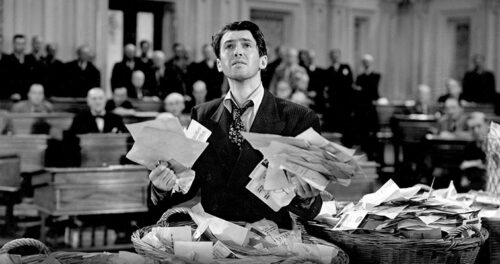[8]
Jimmy Stewart gives a career-defining performance in this Frank Capra classic about a celebrated boy scout leader (Stewart) who gets chosen to fill a deceased senator’s seat in the U.S. congress. His party assumes Stewart will be a doting yes-man, seriously underestimating his sense of duty and patriotism. When he introduces legislation that conflicts with a corrupt land deal, the party tries to take him down in every way possible.
Frank Capra makes excellent use of the Washington D.C. backdrop, with powerful scenes taking place at the Lincoln Memorial and an impressive recreation of the senate chamber. Stewart gives what many believe is his finest performance, transforming his Mr. Smith from gullible tourist to brave defender of democracy. The climactic filibustering scene, in which Stewart dresses down congress for greed and corruption, is one of the most enduring in Hollywood history — and the zenith of a star’s long and distinguished career.
The supporting players are also top-notch. Capra regular Jean Arthur is disarmingly warm, even when she’s skeptical of Smith’s ability to realistically affect change. After Smith inspires her to action, it’s she who then reciprocates when Smith is at his lowest point, in a moving and beautifully shot scene at the steps of the Lincoln Memorial. Claude Rains (Casablanca) brings depth to his role, a fellow senator Smith has long admired, but who ultimately betrays Smith by aligning himself with big business instead of the American people. And Edward Arnold (The Devil and Daniel Webster) is confidently conniving as the powerful tycoon who has managed to wrap Rains around his finger.
Mr. Smith Goes to Washington‘s message may never lose its relevance, not as long as our elected representatives fall victim to the influence of private business. Capra’s trademark, eternal optimism is on full display. I’m a little too jaded to buy into everything the film suggests — especially in the notion that a corrupt congressman would ever see the light and repent for his sins. (It’s far more likely that such such a character would be outnumbered and exiled.) But the film’s end game is a noble one — delivering hope and confidence in democracy, commodities that have become even more precious since the film’s release over eighty years ago.
With Beulah Bondi, Harry Carey, and Astrid Allwyn.
Academy Award: Best Original Story
Oscar Nominations: Best Picture, Director, Actor (Stewart), Supporting Actor (Harry Carey), Supporting Actor (Claude Rains), Screenplay, Art Direction, Sound Recording, Scoring (Dimitri Tiomkin), Film Editing

